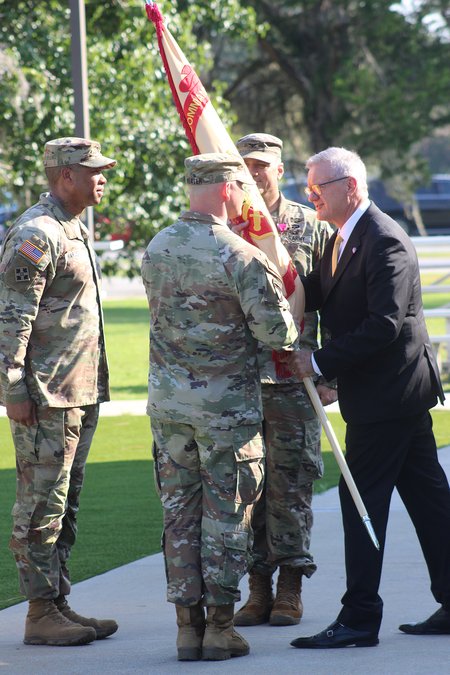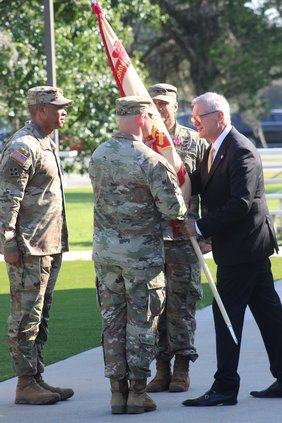Officials said again Tuesday the vast majority of the workers at Hyundai’s manufacturing plants in Black Creek and Richmond Hill will be from the U.S.
But not all. Approximately 100 to 200 families will move here from South Korea at the behest of Hyundai Motor Group Metaplant America, and their reception and treatment was the theme of a pair of two-hour seminars called “Planning for New South Korean Neighbors.”
The events at the Richmond Hill City Center and the Bryan County Schools central office in Black Creek drew a total of perhaps 150 people to hear presentations by retired Army Lt. Col. Jeanne Charbonneau.
Charbonneau, a former West Point instructor who went on to spend 17 years as a consultant for the city of Montgomery, Ala, helped that city make life better for the South Korean families who relocated to the U.S. to work at Hyundai Motor Manufacturing Alabama.
In that regard, her advice to local civic and business leaders during the wide-ranging seminars in Bryan County was to be hospitable and learn to appreciate South Korea’s history, culture and people. And if you can say "yes" to South Korean requests for help, do so.
“We would say as long it’s not illegal, immoral or unethical, we will try to make it happen” she said. “We might not be able to, but we’ll try.”
Charbonneau said it’s important when dealing with South Korean families to realize they didn’t have a say in the matter. They’re usually assigned to a plant for anywhere from two to five years, depending on their job.
It's not, she said, a two-week vacation for them.
“Keep in mind that the families didn’t ask to be uprooted and moved half way around the world,” she said. “Most adjust rapidly and well, but some find it difficult.”
Avoiding reinvention of the wheel
The seminars were organized by the Development Authority of Bryan County, the World Trade Center Savannah, the Savannah Harbor-Interstate 16 Corridor Joint Development Authority and the Richmond Hill Bryan County Chamber of Commerce. Others are being held this week in Pooler, Bulloch and Effingham counties.
They’re a formal attempt to help local business and civic leaders, and those who want to help, understand the culture shock South Korean families who move here to work at the Hyundai Motor Group Metaplant America or Hyundai Mobis will likely experience.
Officials say it's an effort to avoid "reinventing the wheel," when working with the families. The aim is to ensure word of mouth doesn’t lead to the Coastal Empire getting an international stigma as a bad place to set up shop, Charbonneau said, likening a South Korean family’s experience to that of soldiers in the U.S. military.
“In the military everybody knows there are good assignments and bad assignments,” she said. “It’s the same for them, and nobody wants Savannah to get the reputation as a bad assignment.”
The seminars also are an effort to avoid simple pitfalls likely to be embarrassing for those involved.
For example, “don’t ever ask them which Korea they’re from, no no no no,” said Charbonneau, who spoke without notes during her presentations. For one thing, North Koreans can't come to the U.S. For another, it shows the asker knows little about Korean history or culture.
Other bits of advice include avoiding attempts at humor and use of idioms. Charbonneau said it’s important to understand that even though South Koreans begin learning English in the third grade, it’s still a second language to them. That can make conversations difficult, and often it’s better to communicate by emails or text.
During conversations speak a bit slowly, don't use words that are contractions and don’t yell to get a point across, “because they’re not deaf,” Charbonneau said. And don't be offended if they don't answer a question right away or seem a bit curt in emails or texts, she added.
Also important was ensuring those who may have reason to display the South Korean flag make certain it’s right side up. "Red goes on top," she said, a reference to the red and blue symbol in the center of the South Korean flag. She also warned that South Koreans who come here, while always polite, may already have low expectations of what they'll face because the stereotype of the Ugly American and the perception the U.S. education system is not as good as that in South Korea.
The answer to that is to “go out of your way to be kind,” Charbonneau said. “Do the unexpected. Be nice to them. Welcome them to your neighborhood.”
Chris Smith, an Alabaman with a law degree who worked at Hyundai’s Montgomery plant until he became part of the company’s site selection team that chose Bryan County’s Mega-Site for the Metaplant, spoke briefly after Charbonneau. He said you won’t find better partners than the South Koreans.
“It’s like Jeanne says,” he told those who attended the seminar at the City Center. “You'll enjoy having them in your community. They’re a wonderful people to work with. They’re so polite they’re literally almost polite to a fault, sometimes.”
Just don’t call them employees.
“They’re never called employees, never call them that," Charbonneau said. "They’re known as team members.”
A different culture
Charbonneau made it clear during her presentation she is a fan of South Korean culture, which in one way she likened to that of the American South in terms of hospitality and politeness. But she said Korea’s culture is Confucian-based and therefore puts more emphasis on the “collective” group than that of the U.S., where individual liberties are paramount and enshrined in the Constitution.
Further, a list of historic and cultural comparisons on a slide from Charbonneau’s presentation noted that while both South Korea and the U.S. have capitalist economies and practice religious tolerance, South Korea has a 5,000-year history and is largely a homogenous society. The U.S., meanwhile has a 246-year history and a diverse society, with regional identities, dialects and accents that can be difficult for non-natives to understand.
While both nations value family, work ethic and education, there's a disparity. Charbonneau noted South Koreans traditionally work 16 hour days, six days a week and children go to school year round, and the competition to get into good universities is so fierce older students often are in school all day, come home for supper and then spend hours at night with tutors before going to bed.
Further, in South Korea families the men work while the women, even the highly educated, will give up careers to stay home to raise families, and they’re responsible for ensuring their children are educated. That's their No. 1 priority, Charbonneau said, and as a result their children are generally more advanced in math and science than their peers in the U.S.
“In their culture they believe you spend the first three years of your education learning to read,” Charbonneau said. “Once you learn to read, you spend the rest reading to learn.”
Most live in densely populated urban areas and rent, and property managers take care of most maintenance, Charbonneau said, adding that in Montgomery they met a family that had never changed a lightbulb before and called for the property manager to come take care of it.
She also noted that health care in South Korea, considered among the world’s best, is universal and funded through a public health insurance program. Navigating the U.S. system, with PPOs and HMOs, can be confusing for South Koreans.
While it’s unclear how many South Korean families will choose to live in Bryan County, there are some differences between the plant in Montgomery and here, from the size of the planet to the number of plants to the various communities involved in the four-county JDA.
“We only had one county to work with,” Charbonneau said. “You have four.”
In addition, Hyundai Motors Manufacturing Alabama employs some 3,000 team members and is only about 40 percent of the size of the massive Hyundai Motor Group Metaplant America, a $5.45 billion investment. It is projected to employ approximately 8,100 people at full production. It is slated to begin production in 2025.
The Hyundai Mobis facility in Richmond Hill will employ 1,500 and is an investment of more than $900. Officials want it to open in 2024.
In both cases, the plants are expected to transform not only Bryan County, but the region. Because of that, Charbonneau acknowledged there are likely some who don't like what's coming.
“There are some who are just averse to change,” she said. “You’ll probably never bring them on board. What I would tell them is that this is happening, that it is a wonderful thing and that 95 percent of the community is for it and will embrace it.”
Though South Korean families working for Hyundai may experience culture shock when they arrive in Georgia, the area has been home to Koreans for generations in part due to the proximity of Fort Stewart and Hinesville, both of which have significant Korean populations, and businesses and churches.
There were a handful of South Koreans at Charbonneau’s presentations, including an elderly martial arts instructor who referred to himself as Grand Master Lee.
Lee told those at the Black Creek seminar he was a boy during the Korean War and had nothing, but when he first saw a U.S. soldier he decided he would become a soldier and make the U.S. his home. Waving a briefcase, he offered to do whatever he could to help young South Koreans adapt to their new home.
In Richmond Hill, community members said the barbershop and hair salon My Grandfathers Place already has Korean hairstylists on staff, there are Korean restaurants in Richmond Hill and the Savannah Richmond Hill Holiness Korean Church on Highway 17 is open for business and holds worship services on Sunday.
South Korea is also one of the state’s biggest trading partners, and the Georgia Department of Economic Development projected more than 93,000 Korean-Americans lived in the state in 2021, many in the counties around Atlanta.
One website, Data Zip, estimated that Hinesville has the 10th largest percentage of Koreans in the state, but it was unclear where those numbers came from or how old they were. According to the state’s 2021 numbers, Korea was the 10th largest export market for Georgia while Korea ranked third in exporting products to Georgia, with total trade of more than $9.69 billion.



